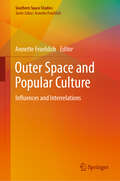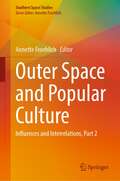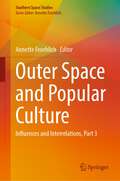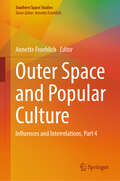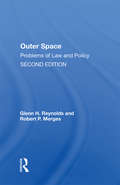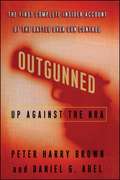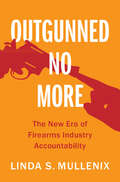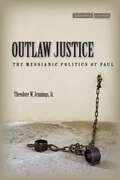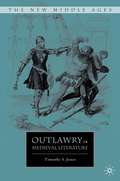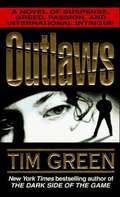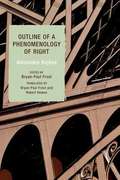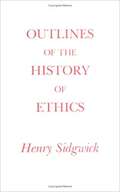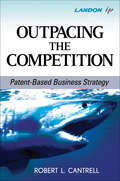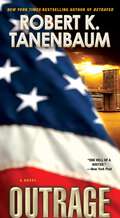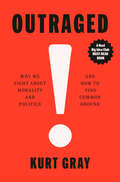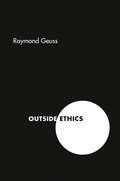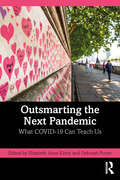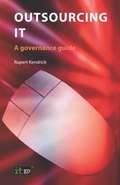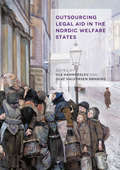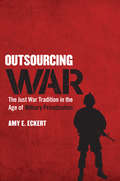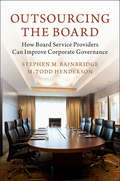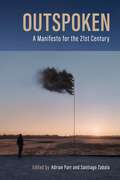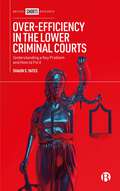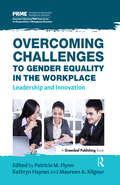- Table View
- List View
Outer Space and Cyber Space: Similarities, Interrelations and Legal Perspectives (Studies in Space Policy #33)
by Annette FroehlichThe book analyses a broad range of relevant aspects as the outer space and cyber space domain do not only present analogies but are also strongly interrelated. This may occur on various levels by technologies but also in regard to juridical approaches, each nevertheless keeping its particularities. Since modern societies rely increasingly on space applications that depend on cyber space, it is important to investigate how cyberspace and outer space are connected by their common challenges. Furthermore, this book discusses not only questions around their jurisdictions, but also whether the private space industry can escape jurisdiction by dematerializing the space resource commercial processes and assets thanks to cyber technology. In addition, space and cyberspace policies are analysed especially in view of cyber threats to space communications. Even the question of an extra-terrestrial citizenship in outer space and cyberspace may raise new views. Finally, the interdependence between space and cyberspace also has an important role to play in the context of increasing militarization and emerging weaponization of outer space. Therefore, this book invites questioning the similarities and interrelations between Outer Space and Cyber Space in the same way as it intends to strengthen them.
Outer Space and Popular Culture: Influences and Interrelations (Southern Space Studies)
by Annette FroehlichThis book provides detailed insights into how space and popular culture intersect across a broad spectrum of examples, including cinema, music, art, arcade games, cartoons, comics, and advertisements. This is a pertinent topic since the use of space themes differs in different cultural contexts, and these themes can be used to explore various aspects of the human condition and provide a context for social commentary on politically sensitive issues. With the use of space imagery evolving over the past sixty years of the space age, this is a topic ripe for in-depth exploration. The book also discusses the contrasting visions of space from the late 19th and early 20th centuries and the reality of today, and analyzes space vehicles and habitats in popular depictions of space from an engineering perspective, exploring how many of those ideas have actually been implemented in practice, and why or why not (a case of life imitating art and vice versa). As such, it covers a wide array of relevant and timely topics examining intersections between space and popular culture, and offering accounts of space and its effect on culture, language, and storytelling from the southern regions of the world.
Outer Space and Popular Culture: Influences and Interrelations, Part 2 (Southern Space Studies)
by Annette FroehlichFollowing on from Part 1, which was highly acclaimed by the space community, this peer-viewed book provides detailed insights into how space and popular culture intersect across a broad spectrum of areas, including cinema, music, art, arcade games, cartoons, comics, and advertisements. This is a pertinent topic since the use of space themes differs in different cultural contexts, and these themes can be used to explore various aspects of the human condition and provide a context for social commentary on politically sensitive issues. With the use of space imagery evolving over the past sixty years of the space age, this topic is ripe for in-depth exploration. Covering a wide array of relevant and timely topics, the book examines the intersections between space and popular culture, and offers accounts of space and its effect on culture, language, and storytelling from the southern regions of the world.
Outer Space and Popular Culture: Influences and Interrelations, Part 3 (Southern Space Studies)
by Annette FroehlichThis book provides detailed insights into how space and popular culture intersect across a broad spectrum of examples, including cinema, music, art, arcade games, cartoons, comics, and advertisements. This is a pertinent topic since the use of space themes differs in different cultural contexts, and these themes can be used to explore various aspects of the human condition and provide a context for social commentary on politically sensitive issues. With the use of space imagery evolving over the past sixty years of the space age, this is a topic ripe for in-depth exploration. The book also discusses the contrasting visions of space from the late nineteenth and early twentieth centuries and the reality of today and analyzes space vehicles and habitats in popular depictions of space from an engineering perspective, exploring how many of those ideas have actually been implemented in practice and why or why not (a case of life imitating art and vice versa). As such, it covers a wide array of relevant and timely topics examining intersections between space and popular culture and offering accounts of space and its effect on culture, language, and storytelling from the southern regions of the world.
Outer Space and Popular Culture: Influences and Interrelations, Part 4 (Southern Space Studies)
by Annette FroehlichFollowing on from the highly acclaimed Parts 1 to 3, this book provides detailed insights into how space and popular culture intersect across a broad spectrum of examples, including cinema, music, art, arcade games, cartoons, comics, and advertisements. This is a pertinent topic since the use of space themes differs in different cultural contexts, and these themes can be used to explore various aspects of the human condition and provide a context for social commentary on politically sensitive issues. With the use of space imagery evolving over the past sixty years of the space age, this is a topic ripe for in-depth exploration. The book also discusses the contrasting visions of space from the late nineteenth and early twentieth centuries and the reality of today and analyzes space vehicles and habitats in popular depictions of space from an engineering perspective, exploring how many of those ideas have actually been implemented in practice and why or why not (a case of life imitating art and vice versa). As such, it covers a wide array of relevant and timely topics examining intersections between space and popular culture and offering accounts of space and its effect on culture, language, and storytelling from the southern regions of the world.
Outer Space: Problems Of Law And Policy
by Glenn Reynolds Robert MergesThis book examines the international and domestic American legal problems associated with activity in outer space from a strong policy perspective, with particular attention given to problems associated with space commercialization and with military activities in outer space. Outer Space: Problems of Law and Policy is indispensable as a casebook, reference, and self-teaching tool for students, practitioners, academics, and members of the aerospace industry.
Outgunned
by Peter Harry Brown Daniel G. AbelOurs is a nation in the grip of a strange kind of mania. Why after President Reagan was shot was there virtually no handgun legislation? Why after the Columbine massacre in Littleton, Colorado, was nothing done to regulate the tools that children most frequently use to kill one another? Why was there no legislative response after a six-year-old in Flint, Michigan, shot a classmate with a .32 caliber "pocket rocket"? Tragedy follows tragedy, with twelve children shot dead every day in America, but guns remain less regulated than automobiles. Why? As authors Peter Harry Brown and Daniel G. Abel in this powerful book demonstrate, it is because of the terrible power of the gun coalition. Outgunned begins with the story of Wendell Gauthier, the "master of disaster" attorney, who brought down the tobacco industry to the tune of billions and then turned his attention to guns. He struck fear into the hearts of the gun manufacturers as he set out to make gunmakers bear some liability for the killings caused by the often poorly made, inaccurate handguns they marketed to criminals. Coauthor Daniel G. Abel worked for Gauthier, along with other attorneys, as the gun-control campaign gathered momentum. This legal initiative seemed to be about to make history and change the face of violence in America, but sadly, Wendell Gauthier died of cancer before meaningful gun control could be established. More than thirty class-action suits against gun manufacturers now languish in courtroom paralysis while as many Saturday night specials as ever are being made. What happened? Brown and Abel demonstrate how the pro-gun forces once again curbed the will of a nation. This book shows the enomous power of the NRA -- how it killed pending legislation in Congress, hijacked the Campaign Act to fund the George W. Bush presidential election victory, and eviscerated the American Shooting Sports Council. That association and the gun manufacturers actually wanted to compromise and agree to new handgun laws, implicitly accepting some liability, but the NRA leadership, with Charlton Heston as their president, crushed them. In Outgunned, Brown and Abel uncover how NRA lobbyists were instrumental in stopping Smith & Wesson in its tracks. They show how the tendrils of the NRA reach into the Christian Alliance and Republican Party, and how men like John McCain have fought back and been undermined. Outgunned reveals how the NRA began dealing with President George W. Bush when he was still governor of Texas -- prodding him into signing a shocking prohibition against the kind of suits Gauthier brought against the gun manufacturers. Outgunned is the story of a legal crusade with up-close accounts of the people who fought every step of the way. For those who believe in the importance of stopping unnecessary bloodshed, this book is essential, powerful, and urgent.
Outgunned No More: The New Era of Firearms Industry Accountability
by Linda S. MullenixOutgunned No More comprehensively addresses the changed legal landscape under which governments and private citizens can sue the gun industry for contributing to and sustaining the gun violence epidemic in the US and Mexico. The book canvasses federal and state efforts to regulate firearms through gun control measures, arguing that these regulatory measures have proven ineffective to stem gun violence. Instead, recourse to robust consumer protection and mass tort litigation provides the best avenue for holding the firearms industry accountable. Chapters highlight three important interventions: the 1998 Tobacco Master Settlement Agreement, the Connecticut Sandy Hook Elementary School litigation, and the recent enactment of consumer protection and public nuisance firearms statutes in nine states. These innovative statutes have created an avenue for litigation that overcomes the firearm industry's historical immunity. Outgunned No More concludes that a firearms mass tort litigation, modeled after the resolution of claims in the tobacco industry, is the best path forward.
Outlaw Justice: The Messianic Politics of Paul (Cultural Memory in the Present)
by Theodore W. Jennings Jr.This book offers a close reading of Romans that treats Paul as a radical political thinker by showing the relationship between Paul's perspective and that of secular political theorists. Turning to both ancient political philosophers (Plato, Aristotle, and Cicero) and contemporary post-Marxists (Agamben, Badiou, Derrida, and Žižek), Jennings presents Romans as a sustained argument for a new sort of political thinking concerned with the possibility and constitution of just socialities. Reading Romans as an essay on messianic politics in conversation with ancient and postmodern political theory challenges the stereotype of Paul as a reactionary theologian who "invented" Christianity and demonstrates his importance for all, regardless of religious affiliation or academic guild, who dream and work for a society based on respect, rather than domination, division, and death. In the current context of unjust global empires constituted by avarice, arrogance, and violence, Jennings finds in Paul a stunning vision for creating just societies outside the law.
Outlawry in Medieval Literature
by Timothy S. JonesDrawing on new historical principles, this book examines literary and historical narratives, legal statutes and records, sermons, lyric poetry, and biblical exegesis circulating in medieval England in order to theorize the figure of the outlaw and uncover the legal, ethical, and social assumptions that underlie the practice of outlawry.
Outlaws
by Tim GreenCody Grey, the Texas Outlaws' assassin on the football field, is facing up to the harsh reality that both his marriage and his pro career are grinding to a painful close. Then comes the broadside tackle that could bench him permanently - and arrest for the murder of the slimy IRS agent who was out to nail him. Only one woman can save him. A brilliant lawyer, Madison McCall reluctantly takes Cody on as a client. Madison risks everything to save a life, solve a murderous puzzle, and keep herself from getting killed along the way.
Outline of a Phenomenology of Right
by Robert Howse Alexandre Kojève Bryan-Paul FrostAlexandre Koj_ve offers a systematic discussion of key themes such as right, justice, law, equality, and autonomy in which he presages our contemporary world of economic globalization and international law. Edited and translated (with Robert Howse) by Bryan-Paul Frost, this is the authoritative English language translation of a monumental work in political philosophy.
Outpacing the Competition
by Robert L. CantrellPraise for Outpacing the Competition Patent-Based Business Strategy "Outpacing the Competition provides a useful IP management framework for rapidly evolving and inherently unpredictable R&D environments where companies are partners, customers, and competitors at the same time. " -Marshall Phelps, Corporate Vice President for IP Policy & Strategy, Microsoft "Robert Cantrell's book Outpacing the Competition: Patent-Based Business Strategy?should be read by?anyone?involved in the practice of litigating or licensing patent rights or policymakers responsible for patent issues. Mr. Cantrell provides a cogent approach for applying decisional methodology and game theory to enhance the utilization and understanding of patent rights. "-Bradley J. Olson, Esq. , patent attorney, Washington, DC "Robert Cantrell makes a compelling case for using intellectual property as a core for building solid business strategy. He provides a unique and valuable perspective on competitive advantage, as delivered through patent-based business strategy. This is an excellent addition to anyone's business strategy arsenal. " -Jeff Hovis, Managing Principal, Product Genesis, Innovation Genesis LLC "Robert truly treats patents and related intellectual property as both a weapon and a shield to help the reader use patents to out-maneuver global competitors of all kinds-the low-cost producer, the high-end innovator, etc. CEOs, attorneys, business and engineering professionals and the like will enjoy the military imagery and flavor provided by Robert. Thanks for clarifying how critical it is to have an understanding of patents in running a truly competitive global business today. " -José W. Jimenez, Esq. , Chief Intellectual Property Officer,AMS Research Corporation
Outrage (A Butch Karp-Marlene Ciampi Thriller #23)
by Robert K. TanenbaumIn Robert K. Tanenbaum’s electrifying thriller, District Attorney Butch Karp battles a failure of the system, a police detective desperate to solve a case for his own ends, and a homicidal maniac who will stop at nothing to protect the truth. Months after a brutal double homicide in uptown Manhattan shocks the city, sensational newspaper headlines herald the arrest and indictment of Felix Acevedo, a shy Bronx teenager who confessed to the horrific crimes. But downtown, in the district attorney’s office, Butch Karp is seething. No sooner does he bask in the relief of successfully closing the case on murderous imam Sharif Jabbar than he is thrust into the center of a high-profile prosecution that threatens the integrity of his office. An ambitious young assistant district attorney, seeking career advancement, cuts corners to indict Acevedo, disregarding Karp’s fundamental rule: Never charge the accused unless the evidence leads inexorably to proof beyond a reasonable doubt. Now, damned by a coerced confession and a frenzied media bent on lynching him, Acevedo sits in jail while a vicious killer stalks the city. Karp’s wife, Marlene Ciampi, one half of the “crime-fighting family” proclaimed by the media, hits the streets for clues that will save the unjustly accused defendant. What she discovers puts her on the trail of the true perpetrator—a drug-addicted psychopath with an ax to grind—and a disgruntled police detective who is willing to lie, withhold evidence, and kill to be labeled a hero. But it also puts her in the center of a dangerous race to be the last man standing and if she’s not careful, one of the other players will take the prize. From the gruesome crime scene to a trial that will leave readers on the edge of their seats, Robert K. Tanenbaum’s unstoppable novel unfolds at breakneck speed as Karp and Ciampi fight for justice in a dramatic and challenging case that will thrill readers to the bone.
Outraged: Why We Fight About Morality and Politics and How to Find Common Ground
by Kurt GrayA groundbreaking new perspective on the moral mind that rewrites our understanding of where moral judgments come from, and how we can overcome the feelings of outrage that so often divide usIt&’s easy to assume that liberals and conservatives have radically different moral foundations. In Outraged, Kurt Gray showcases the latest science to demonstrate that we all have the same moral mind—that everyone&’s moral judgments stem from feeling threatened or vulnerable to harm.We all care about protecting ourselves and the vulnerable. Conflict arises, however, when we have different perceptions of harm. We get outraged when we disagree about who the &“real&” victim is, whether we&’re talking about political issues, fights with our in-laws, or arguments on the playground.In this fascinating and insightful tour of our moral minds, Gray tackles popular myths that prevent us from understanding ourselves and those around us. While it is commonly believed that our ancestors were apex predators, Gray argues that for the majority of our evolutionary history, humans were more hunted than hunter. This explains why our minds are hard-wired to perceive threats, and provides surprising insights on the scientific origins of our values and beliefs. Though we might think ourselves driven by objective reasoning, Gray unveils new research that finds our moral judgments are based on gut feelings rather than rational thought, and presents a compelling reminder that we are more alike than we might think.Drawing on groundbreaking research, Gray provides a captivating new explanation for our moral outrage, and unpacks how to best bridge divides. If you want to understand the morals of the &“other side,&” ask yourself a simple question—what harms do they see?
Outside Ethics
by Raymond GeussOutside Ethics brings together some of the most important and provocative works by one of the most creative philosophers writing today. Seeking to expand the scope of contemporary moral and political philosophy, Raymond Geuss here presents essays bound by a shared skepticism about a particular way of thinking about what is important in human life--a way of thinking that, in his view, is characteristic of contemporary Western societies and isolates three broad categories of things as important: subjective individual preferences, knowledge, and restrictions on actions that affect other people (restrictions often construed as ahistorical laws). He sets these categories in a wider context and explores various human phenomena--including poetry, art, religion, and certain kinds of history and social criticism--that do not fit easily into these categories. As its title suggests, this book seeks a place outside conventional ethics. Following a brief introduction, Geuss sets out his main concerns with a focus on ethics and politics. He then expands these themes by discussing freedom, virtue, the good life, and happiness. Next he examines Theodor Adorno's views on the relation between suffering and knowledge, the nature of religion, and the role of history in giving us critical distances from existing identities. From here he moves to aesthetic concerns. The volume closes by looking at what it is for a human life to have "gaps"--to be incomplete, radically unsatisfactory, or a failure.
Outsmarting the Next Pandemic: What Covid-19 Can Teach Us
by Elizabeth Anne Kirley Deborah PorterThis book examines the role of law and policy in addressing the public health crisis of COVID-19 and offers reforms that could improve pandemic preparedness for future outbreaks. Focusing on a number of countries most expected to provide agility and organization in their crisis response – the United States, Canada, Australia, the United Kingdom and Taiwan – the book shows how failures in leadership from governments, executives, and institutions created a vacuum that was quickly filled by naysayers, conspiracy theorists, vaccine hucksters, and fake news generators. Through the key themes of healthcare, leadership, security, and education, the chapters address critical questions: Why have masks become such a polarizing force? How do you self-isolate if you don’t have a home? How should equitable triage models for overwhelmed frontline healthcare workers be developed? Can we utilize artificial intelligence to educate the public about manipulated information they access concerning the pandemic? The book was written during the pandemic and weaves in to each chapter vignettes with personal revelations from a broad range of countries, including some also grappling with poverty, war, natural disasters, or revolution. It will appeal to academics, professionals, and policymakers interested in how law and health policy can converge on solutions for global infectious disease. It is suitable for use in upper-level courses.
Outsourcing IT: A Governance Guide
by Rupert Kendrick"Outsourcing IT - A Governance Guide" addresses three componentsof the governance of IT outsourcing: the IT outsourcing process;the nature of governance and the use of methodologies and toolsfor the implementation of governance principles; and, themanagement of risk within the IT outsourcing process. Theobjectives of the book are first, to provide boards of directorswith clear criteria for the application of governance principlesin an IT outsourcing environment; and, second, to provideguidance on useful strategies, processes and procedures for theirimplementation. The author, Rupert Kendrick, is a non-practisingsolicitor and, for many years, was a partner in a medium-sizedlaw firm. He has written, trained and consulted widely in thelegal profession on legal IT issues.
Outsourcing Legal Aid in the Nordic Welfare States
by Olaf Halvorsen Rønning Ole HammerslevThis book is open access under a CC BY 4. 0 license. This edited collection provides a comprehensive analysis of the differences and similarities between civil legal aid schemes in the Nordic countries whilst outlining recent legal aid transformations in their respective welfare states. Based on in-depth studies of Norway, Sweden, Finland, Denmark, and Iceland, the authors compare these cases with legal aid in Europe and the US to examine whether a single, unique Nordic model exists. Contextualizing Nordic legal aid in relation to welfare ideology and human rights, Hammerslev and Halvorsen R#65533;nning consider whether flaws in the welfare state exist, and how legal aid affects disadvantaged citizens. Concluding that the five countries all have very different legal aid schemes, the authors explore an important general trend: welfare states increasingly outsourcing legal aid to the market and the third sector through both membership organizations and smaller voluntary organizations. A methodical and compassionate text, this book will be of special interest to scholars and students of the criminal justice, the welfare state, and the legal aid system.
Outsourcing War: The Just War Tradition in the Age of Military Privatization
by Amy E. EckertRecent decades have seen an increasing reliance on private military contractors (PMCs) to provide logistical services, training, maintenance, and combat troops. In Outsourcing War, Amy E. Eckert examines the ethical implications involved in the widespread use of PMCs, and in particular questions whether they can fit within customary ways of understanding the ethical prosecution of warfare. Her concern is with the ius in bello (right conduct in war) strand of just war theory. Just war theorizing is generally built on the assumption that states, and states alone, wield a monopoly on the legitimate use of force. Who holds responsibility for the actions of PMCs? What ethical standards might they be required to observe? How might deviations from such standards be punished? The privatization of warfare poses significant challenges because of its reliance on a statist view of the world. Eckert argues that the tradition of just war theory—which predates the international system of states—can evolve to apply to this changing world order. With an eye toward the practical problems of military command, Eckert delves into particular cases where PMCs have played an active role in armed conflict and derives from those cases the modifications necessary to apply just principles to new agents in the landscape of war.
Outsourcing the Board: How Board Service Providers Can Improve Corporate Governance
by Stephen M. Bainbridge M. Todd HendersonIn this groundbreaking work, Stephen M. Bainbridge and M. Todd Henderson change the conversation about corporate governance by examining the origins, roles, and performance of boards with a simple question in mind: Why does the law require governance to be delivered through individual board members? While tracing the development of boards from quasi-political bodies through the current “monitoring” role, the authors find the reasons for this requirement to be wanting. Instead, they propose that corporations be permitted to hire other business associations – known as “Board Service Providers” or BSPs – to provide governance services. Just as corporations hire law firms, accounting firms, and consulting firms, so too should they be permitted to hire governance firms, a small change that will dramatically increase board accountability and enable governance to be delivered more efficiently. Outsourcing the Board should be read by academics, policymakers, and those within the corporations that will benefit from this change.
Outspoken: A Manifesto for the Twenty-First Century (Outspoken)
by Adrian Parr and Santiago ZabalaIn a world of increasing right-wing populism, global capitalism, and a climate emergency, leading thinkers come together to interrogate the meaning and practice of being outspoken. The violence, nativism, persecution, and social hostilities of the twenty-first century demand a call to order: philosophical and theoretical communities must commit their intellectual resources to confronting and articulating the structures, desires, and resentment driving the dismantling of democratic values. Action in the absence of understanding and political vision devoid of inclusive ideas are all the more vulnerable to taking a reactionary turn. Contributors to this volume challenge the return of fascism, dehumanization of immigrants, distrust of science, intolerance of fair and equitable economic models, and suspicion of inclusive political platforms. All, in their own way, tackle the burning question of how we might reimagine twenty-first-century life in the face of divisive forces. Outspoken includes essays by some of the world’s most radical thinkers – Rosi Braidotti, Henry A. Giroux, Amelia Jones, and Slavoj Žižek, among others – who together chart multiple progressive courses for political antagonism and social intervention.
Over-Efficiency in the Lower Criminal Courts: Understanding a Key Problem and How to Fix it
by Shaun S. YatesIn our pursuit of efficiency in the lower criminal courts, have we lost sight of quality justice? Through the critical examination of original stenographic data, this book demonstrates how an English Magistrates' courthouse often pursued managerial efficiency to the detriment of social justice and procedural due process values. Given that these courts process more than 95% of all criminal cases, this ‘over-efficiency’ problem has the capacity to cause significant social harm. Yates’ work concludes by providing socio-legal and criminological readers with ways to fix this over-efficiency problem. This accessible work is of value to policy makers and post-graduate students alike.
Overcoming Challenges to Gender Equality in the Workplace: Leadership and Innovation (The Principles for Responsible Management Education Series)
by Kathryn Haynes Patricia M. Flynn Maureen A. KilgourMany businesses and organizations are increasingly aware of the case for promoting gender equality, both within and outside their organizational boundaries. Evidence suggests that gender equality in the workplace boosts performance, and legal frameworks in many countries mandate specific action on gender inequality in the workplace. However, despite organizational policies on promoting equality and equal opportunities, there remain challenges to be overcome in many businesses, including throughout their supply chains. The book provides research rationales as to why responsible organizations must address the issue of gender equality in the workplace. It also presents case studies, action research and examples of good practices, describing how businesses and organizations are working to promote gender equality in various contexts. The book is designed to support the rationale for gender equality in business and organizations, providing evidence of implementation of gender equality in the workplace and advice on how to deal with and overcome challenges. It will be of interest to academics, employees, practitioners, policy-makers, businesses, institutions and organizations.

